By Charlene Muhammad CHARLENEM
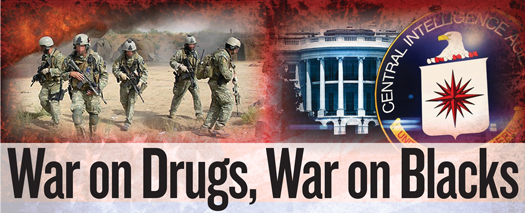
Nixon aide admits Blacks were targeted but does anyone even care?
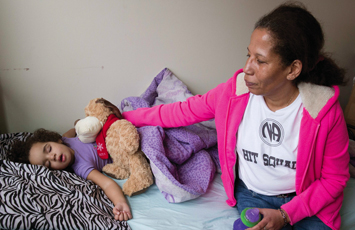
A “tell us something we don’t know” sentiment is circulating throughout Black America with an admission that America’s War on Drugs was designed to target Blacks, along with anti-war activists.
The major question: Who will be held accountable? The disheartening and likely answer: No one. So, what are Blacks to do about the news, a shocking bombshell to some and run of the mill admission to others?
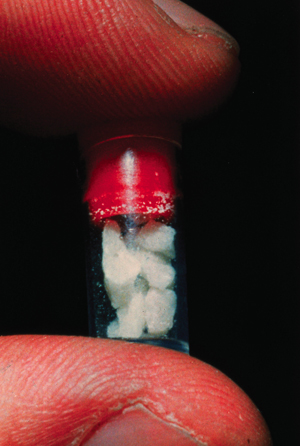
“America has created an environment, particularly as it relates to race, that makes us think we’re overly paranoid and downright crazy when we see certain things. And when we have enough sophistication to know what it is, when we see a construct that is not normal appear, they try to convince us that it is coincidence,” said Dr. Anthony Asadullah Samad, author and educator.
Blacks have witnessed this time and time again, he said, so the comments by John Erlichman, a former aide to President Nixon came as no surprise. In the 1980s, Blacks cried out against mandatory minimum sentences, and federal sentencing guidelines, arguing all were vehicles to expediently build the prison industrial complex, he noted.
“Folks said it was a figment of our imagination, that it didn’t happen like that,” Dr. Samad recalled. When Blacks said drugs and guns were planted in their community in the 1990s, there were again denials and disbelief, he continued.
“We need a revolution. We actually need to get rid of this system,” said Carl Dix of the October 22nd Coalition to Stop Police Brutality, Repression and the Criminalization of Generation and the Revolutionary Communist Party.
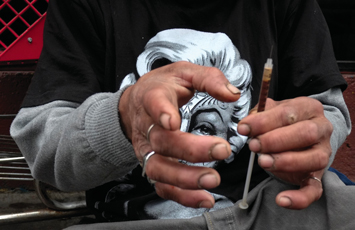
Blacks are often told if they get behind the right candidate, the problem will be dealt with, but even after helping to elect and re-elect the first Black president, nothing has been done about conditions Blacks face, Mr. Dix told The Final Call.
Fighting words
Mr. Ehrlichman, an assistant to former President Richard Nixon, told journalist Dan Baum: “The Nixon campaign in 1968, and the Nixon White House after that, had two enemies: the antiwar left and black people. You understand what I’m saying? We knew we couldn’t make it illegal to be either against the war or black, but by getting the public to associate the hippies with marijuana and blacks with heroin, and then criminalizing both heavily, we could disrupt those communities. We could arrest their leaders, raid their homes, break up their meetings, and vilify them night after night on the evening news. Did we know we were lying about the drugs? Of course we did,” Mr. Baum reported.
The author has released the quote (which he obtained during a 1992 interview for his book, “Smoke and Mirrors: The War on Drugs and the Politics of Failure”) several times over the years.
But recent fallout came after he again released it in Harper’s Magazine’s April cover story (“Legalize It All: How to win the war on drugs”).
Mr. Baum told The Final Call he understands how the quote could be seen as extremely racist. However, he does not think Mr. Erlichman was speaking from a place of racism.
“I don’t think he was saying, ‘We hate Black people so we’re going to go f—k ‘em up.’ He was saying, we had a political problem. Black America was hostile to us,” Mr. Baum said.
Black America warned
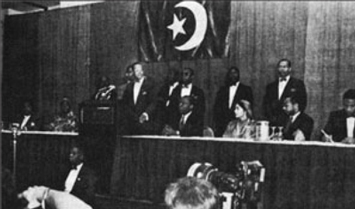
In a press conference on October 24, 1989, the Honorable Minister Louis Farrakhan of the Nation of Islam warned America was planning a war against Libya, while simultaneously planning a war against Black America, Black youth, in particular, and against the Nation of Islam. The domestic plot was covered under a guise of a war against drugs, he added.
The Minister said he received instructions to make the announcement from the Honorable Elijah Muhammad during his “More Than A Vision” experience when he was taken up in The Mother Plane or Wheel.
“President Reagan has met with the Joint Chiefs of Staff to plan a war. I want you to hold a press conference in Washington, D.C., and announce their plan, and say to the world that you got the information from me on The Wheel,” Min. Farrakhan stated at that time.
He held another press conference from Ghana during his World Friendship Tour.
“I am here to announce today that President Bush has met with his Joint Chiefs of Staff under the direction of General Colin Powell to plan a war against the Black people of America, the Nation of Islam and Louis Farrakhan with particular emphasis on our Black youth under the guise of a war against drug sellers, drug users, gangs and violence,” Min. Farrakhan said.
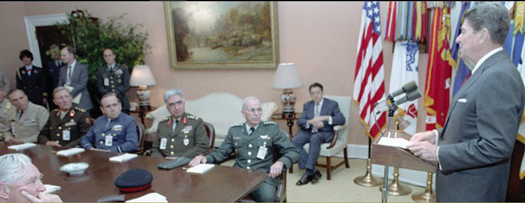
Later it was reported that the Reagan administration had planned a war against Libya and the Nixon aide’s admission is one of many proofs that the War on Drugs was a sham and targeted Black America.
The failed War On Drugs
“The fact of the matter is it certainly has the impact of incarcerating massive numbers of people, disproportionately minority, and the so-called War on Drugs had virtually no impact on drug use,” said Rep. Bobby Scott (D-Va.).
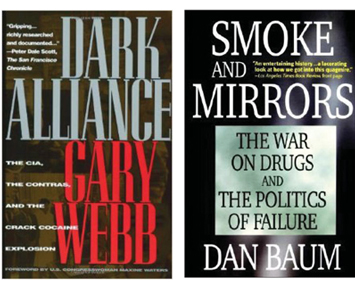
“Using incarceration to try to reduce drug use is a failed strategy, and everybody knows it,” the congressman argued. But America continued President Nixon’s failed strategy, even under the 1994 Crime Bill with the Congress under Democratic control, he added.
Signed into law by former President Bill Clinton, the $30 billion Omnibus Crime Control Act provided for more beat cops, tougher prison sentences and money to build more prisons. It also expanded the federal death penalty to 60 crimes.
“The idea that we continue that policy, knowing the discriminatory impact for as long as we did is just unconscionable,” Rep. Scott told The Final Call.
Mainstream and grassroots solutions
Rep. Scott co-introduced the Safe, Accountable, Fair, and Effective (SAFE) Justice Act of 2015 (H.R. 2944) with Representative Jim Sensenbrenner (R-Wisc.) as a solution to the policy problem.
The legislation is designed to rollback mandatory minimum sentences, invest in early intervention and diversion programs, and reduce crime, particularly drug use, Rep. Scott said.
Research shows drug use can be significantly reduced with prevention, intervention, and rehabilitation, while at the same time saving money by avoiding prison, he said.
“I think we’re going to keep chipping away at it, and trying to take away their ability to continue to punish us,” said Dorsey Nunn of the All Of Us Or None prison advocacy organization and executive director of Legal Services for Prisoners with Children.
Blacks have to come to grips with the idea they could be seeing the end of marijuana prohibition, which means legalization in California as in Colorado, he said.
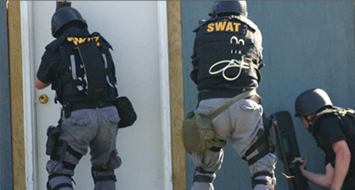
That could mean a multi-billion dollar industry, but what role would Blacks play in it, since their children are already smoking and consuming marijuana? he asked.
“You could start seeing a Phillip Morris taking over the market, and you could wind up seeing bits and pieces of marijuana named after famous hip hop artists or famous reggae artists, and being sold in our community,” Mr. Nunn observed.
If Blacks actually want to get away from the failed drug war, they need to figure out how to keep from being killed and simultaneously not allowing others to capitalize and exploit them, he said.
“Think about it. When they were ending stuff like alcohol prohibition, it wasn’t like they didn’t have Black bootleggers. We just didn’t wind up with liquor stores,” Mr. Dorsey argued.
“And when we were doing number runners, it wasn’t like they stopped number running. They just changed the name of it, and called it Lotto, and absorbed the space. We could be getting to that point where we’re doing that around questions of marijuana,” he said.
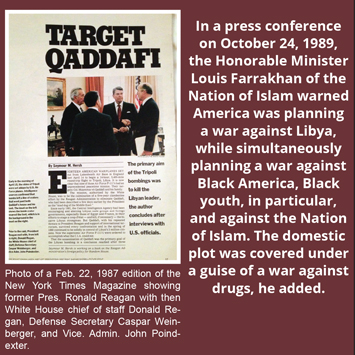
The solution is difficult, especially when people keep working through the very system responsible for the problems, said Mr. Dix.
“It is the case right now that Obama has begun to let some of the folk who have been warehoused in prison over the decades out, but the numbers of people coming out are in the dozens, whereas hundreds of thousands of people got framed into prison and railroaded,” Mr. Dix noted.
Justice could be sought at the polls, if a candidate was serious about U.S. drug policy reform, but many people have been disenfranchised because of the same laws.
An estimated 5.85 million Americans are denied the right to vote because of laws that prohibit ex-felons from voting, leaving 1 in every 13 Blacks unable to vote, according to the Sentencing Project, which works to change sentencing policy and advocates for alternatives to incarceration.
Desmond Meade, president of the Florida Rights Restoration Coalition, said as an American citizen, he is injured by the unjust voting restriction. He is especially troubled this year, he cannot even vote for his own wife, Sheena, who is running for office in Orlando’s 46th District.
“That feeling of not being able to vote for her … it’s very disheartening, and I think it’s a slap in the face of democracy,” he said.
That is especially true when nearly two million Floridians are disenfranchised because of past mistakes, but at the same time, citizens in Puerto Rico are participating in the Republican primary, he argued.
He is leading a movement in Florida to automatically restore voting rights to ex-felons who have completed their sentences. “What we can do in a nutshell is that we allow people who have served their time the right to vote,” Mr. Meade said.
U.S. presidents waged a war at home
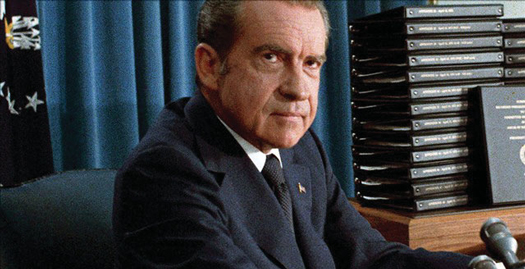
President Nixon declared a war on drugs in 1971, and as chronicled by the Drug Policy Alliance, a national drug law reform organization, the Republican increased the size and presence of federal drug control agencies. He pushed through mandatory sentencing and no-knock warrants, and placed marijuana in the most restrictive category of drugs.But even before President Nixon, the first anti-cocaine laws in the South in the early 1900s, targeted Black men, the Drug Policy Alliance noted. Then came anti-marijuana laws targeting Mexican migrants and Mexican Americans in the Midwest and the Southwest in the 1910s and 20s, and today, Latinos and especially Blacks bear the brunt of wildly disproportionate drug enforcement and sentencing practices, the alliance added.
During Pres. Reagan’s tenure in the 1980s and ’90s, incarceration rates skyrocketed due to his unprecedented expansion of the drug war, the Drug Policy Alliance said. The number of people incarcerated for nonviolent drug law offenses increased from 50,000 in 1980 to over 400,000 by 1997.
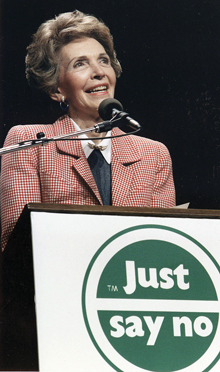
When President Reagan’s wife, Nancy, launched her “Just Say No” anti-drug campaign, along came zero tolerance policies.
In the 1980s, journalist Gary Webb reported a series of articles in the San Jose Mercury News, revealing how the CIA had been funneling crack cocaine into America’s ghettos for nearly a decade. The paper retracted the series and Mr. Webb was the reported victim of suicide–but many believe his accounts were true.
In a groundbreaking yearlong series called “Dark Alliance,” published in 1996, Mr. Webb reported connections between the CIA and millions of dollars in cocaine sales that benefitted Nicaraguan Contras in their 1980s fighting the ruling leftist Sandinista government. Congress had quashed funding for the anti-Communist fighters loved by Ronald Reagan and the right wing.
“Those drug dealers were flying weapons down to Nicaragua, and then when the planes came back, they were not empty, but they brought drugs back into the country,” said Mr. Dix.
Some who were outraged by that history took to change.org, where fans of hip hop artist Fetty Wap launched a petition to have the rapper perform his single, “Trap Queen” at Nancy Reagan’s memorial service on March 11.
In “Trap Queen,” Fetty Wap’s debut single, he raps about teaming up with his woman in the drug game and cooking drugs in a “trap”, a place where illicit drugs are processed and drug deals go down.
Mrs. Reagan, who died on March 6, left an unforgettable legacy as the First Lady of the United States, but “she holds the important legacy as being the most famous Trap Queen in American history,” read the petition authored by David D.
“While her husband, Ronald Reagan, was linking up with Papi to flood the streets with narcotics, Nancy was on TV telling kids to ‘Say No To Drugs.’ Her infamous ‘anti-drug’ phrase encouraged strict laws on drug possession that led to a school-to-prison pipeline we’re still dealing with now,” the petition said.
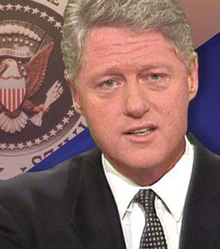
“Blacks and Latinos went to jail in droves for possessing drugs her husband gave them. It was an incredible sleight of hand that would make any wannabe Trap Queen hide in shame for her inability to be as diabolical as Nancy,” the online petition continued.
Laugh if you must–but the petition garnered 7,835 of 10,000 targeted signatures.
Both former Presidents Clinton and George W. Bush rapidly escalated the militarization of domestic drug law enforcement, the Drug Policy Institute said. By the end of the latter’s term, there were about 40,000 paramilitary-style SWAT raids on Americans every year–mostly for nonviolent drug law offenses, often misdemeanors.
In 2010, President Obama passed the Fair Sentencing Act, which reduced the ratio for prison terms for crack vs. powder cocaine from 100 to 1 to 18 to 1.
During the rest of his time in office, he plans to issue grants of clemency and strengthen rehabilitation programs, according to White House counsel Neil Eggleston.
Critics argue President Obama could and should have done more to reduce sentencing disparities.
No apologies, no justice?
“They haven’t even apologized for slavery, so they’re definitely not going to apologize and give any retribution for guys who sold drugs, because first of all, they look at them like, you’re a drug dealer. You’re a criminal, so you don’t deserve anything,” said “Freeway” Ricky Ross, former drug dealer now inspirational and motivational speaker.
Mr. Nunn said he is not holding his breath, waiting on government to even feel accountable, at least not to Blacks in any real particular way.
Several friends are out of prison after changes to draconian Three Strikes and You’re Out law passed by former President Clinton.
“Three Strikes” was supposed to mean a life sentence for anyone convicted of three violent felony crimes, but instead, many people were buried in America’s prisons for nonviolent or non-serious crimes like stealing a slice of pizza or shoplifting.
Mr. Dorsey said some of his friends were incarcerated for petty crimes, including one for possession of $10 worth of heroin.
“I went up to him, all excitedly and said, ‘Man! Being that they changed the law, and minor bits of drugs are now a misdemeanor, do you want me to help clean up your record,’ ” Mr. Nunn recalled.
“He looked me straight in the eye, and sent a cold chill on me. He said, ‘Well, how do you clean up my life? They took 20 years.’ ”
“I didn’t have an answer for that stuff, and I still don’t have an answer for that stuff. They’re the only ones in the world that get to say, ‘I’m bad,’ and nobody gets punished behind that,” Mr. Nunn told The Final Call.












